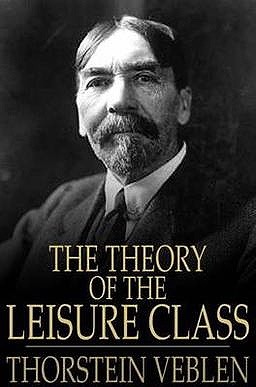Inconspicuous

" … enable each of us to make choices which could leave us stepping a little more lightly as we conspicuously stomp around our Eden"
A hundred and twenty years ago, early economist Thorstein Veblen published his The Theory of the Leisure Class: An Economic Study of Institutions. The book reads almost as if it were parody, like any great work of economic theory should. He noted a strong correlation in the US between what he labeled Conspicuous Consumption and status. The higher the status, the more one would willingly pay. He noted that the old 'buy cheap, sell dear' ability said to underpin capitalism was not evident among major capitalists. Quite the opposite. Maintaining status required public profligacy. He provided numerous examples, several aimed at what we now call Elite Institutions, universities that built and maintained terribly expensive Gothic enclaves. As with anyone audacious enough to commit this sort of public truth, he was eventually blackballed out of academe. He died a decidedly inconspicuous death while living in an empty shipping crate which was situated just off Sand Hill Road, where Silicon Valley's venture capitalists now maintain offices, overlooking Stanford University's gothic enclave in Palo Alto. He'd reportedly adopted a pet skunk, the only remaining company he managed to maintain through his declining popularity.
Judging by the number of McMansions and McEstates dotting the Front Range around my more humble abode, conspicuous consumption has not diminished in popularity over the intervening years. The gentry here do not queue up in front of the dented can store or the Goodwill, but seem to reserve their shopping time for the exurban Flat Iron Mall or Amazon Prime Plus. They do not trade in hand-me-downs, other than, perhaps, to contribute to one of the tonier consignment shops in Evergreen or Cherry Creek. They drive flashy cars that line up behind me looking for any opportunity to pass, the riskier the turn, the seemingly better. I can understand how a couple might aspire to live in their very own private 9,000 square foot shack with an unobstructed view of the Continental Divide, but I can't quite grok how they justify the extravagance, but that mystery's about me, not about them.
I'm growing more concerned about what former NYTimes environmental journalist and author Tatiana Schlossberg calls, in her August 2019 book, 'inconspicuous consumption, the environmental impact you don't know you have' (2019, Grand Central Publishing, NY ISBN-13: 9781538747094). There, she describes the shadow side of our long-standing conspicuous consumption, which seems plenty wasteful all by itself. Did you know that because the internet backbone resides within a coal-fueled grid, that your Netflix binges are also coal powered? Her work overflows with similarly disconcerting revelations which could quite easily convince even a more casual and disinterested reader that we're simply screwed. I quite literally cannot move without inflicting some impact on our environment, no matter how conspicuous or inconspicuous that move might seem. The beans I'm presently reheating in the natural gas fired double boiler might quite properly be served with a side of an unappetizing lump of coal. It turns my stomach to think about this, which might explain why I very strenuously avoid thinking about this.
The inconspicuousness seems hard-wired into my behavior now. I might scowl while waiting for that mile long coal train to clear the crossing, but some of its load was ordered to satisfy my mindless consumption which I do not (and probably cannot) fully acknowledge. Yes, I push around a lawn mower powered only by my muscle power, but maintaining that power source taps a few less renewable ones. I might eat beans, but always with a little lump of coal on the side. There seems no place to hide. Even my hidey hole probably relies upon some coal-fired appliance to exist. The members of the current leisure class might still seek opportunities to publicly display their wealth, but even their more insidious consumption displays considerably more stealth. Modern life insists that we each become complicit, no whining allowed.
I envision a million dollar app, one that will, at the bottom of each month's credit card statement, assign little lumps of coal to represent the inconspicuous consumption the purchases represent. Buy an airline ticket, and this app calculates the environmental impact the trip contributed. Buy a tankful of gas, and the little lump of coal grows. Year-to-date averages could show whether one's inconspicuous appetite shrunk or grew over time. At the end of each calendar year, let's say on Earth Day, some award could be offered to those who reduced their footprint over the prior year. One key to encouraging real change emerges from simply making the implicit more explicit. Creating a more explicit record of inconspicuous contributions to our collective carbon footprint might enable each of us to make choices which could leave us stepping a little more lightly as we conspicuously stomp around our Eden. Heck, it might even preserve a little more of our Eden before it's gone.
©2019 by David A. Schmaltz - all rights reserved


